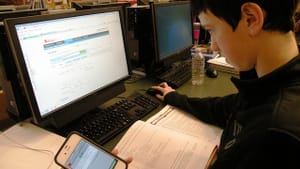Stay in the Loop
BSR publishes on a weekly schedule, with an email newsletter every Wednesday and Thursday morning. There’s no paywall, and subscribing is always free.
How smart do you have to be to go to the theater nowadays?

More and more, when I get home from seeing a play or movie, or when I finish reading a book, I find myself searching the Internet to find out more about the story I just watched or read. I don’t know if this is a good thing.
I really like to be engrossed in a story that is a self-contained entity. I don’t want to keep asking myself — Is that true? Did that really happen? Theater, film, and literature are good mediums to tell the story behind the story, even if it is totally speculative (What was Andy Warhol really like? Why did Lord Byron leave England?) or set in a fictional universe (What was the relationship between the witches in Oz?). Even so, when the writer assumes the audience has prior knowledge about a subject, it takes us out of the story and gets us thinking about the piece instead of being immersed in it.
This year’s theater season has me running to the computer after every performance. (No, I don’t Google during the show — though I have been tempted.)
Unstirring the jam
I recently saw Tom Stoppard’s Arcadia at the Lantern Theatre Company. Beneath the witty banter and excellent performances was a deep discussion about the universe, and I had to dash home afterward and search for Sir Isaac Newton and the second law of thermodynamics — and try to figure out a way to unstir jam in rice pudding, which I never eat, and wonder how those hot pads you put in your gloves in winter can possibly work since, as I understand the law, everything tends toward room temperature. (Okay, that’s not what it says, but that’s what I’m going with, otherwise I would have to paraphrase a lot of scientific jargon I don’t understand.)
But is that what the play is about? Or is it showing us that what we consider history is just an imagining of the events of the past, since we see the actual event and then the later interpretation? For example, we watch as Thomasina (Alex Boyle), a brilliant mathematician, adds an imaginary hermit to a drawing, and later we see scholarly Hannah (Kittson O’Neill) searching for the history of that hermit, who may or may not have been Thomasina’s tutor Septimus (Maxwell Eddy).
I could also see it as a play about the ways women are discounted in the intellectual arena, since it is assumed, at least by the men in the piece, that Thomasina, the young woman who was so bright she came up with a formula that could only be completed by a not-yet-invented computer, and Hannah, writing a book on the garden, were doing work inferior to that of Dr. Nightingale (Joe Guzmán), a scholar noted for his bombast if not his brilliance, who wants to prove that Byron killed a man and had to leave England.
What did Phyllis Schlafly say?
But wait, that’s the subject of Rapture, Blister, Burn at the Wilma Theater, about a rock-star academic struggling with her choice of career over caring, which had me searching for what Phyllis Schlafly actually said about the price women pay for liberation. And checking dates for the various waves of feminism and trying to figure out where I belonged in that history.
And Byron was the subject of the Fringe festival performance of the modern opera By You That Made Me, Frankenstein, about the writing of Frankenstein, another work that had me wondering how much was based on fact. A lot, it seems. Byron and his friends did spend time together in Switzerland, but the event depicted in the opera was imagined. And did you know that Byron’s daughter, Ada Lovelace (1815-1852) was a mathematical genius? And that Percy Bysshe Shelley’s wife, Mary Shelley, author of Frankenstein, was the daughter of the feminist Mary Wollstonecraft, who wrote A Vindication of the Rights of Woman in 1792? Did you know that Frankenstein is not killed by angry villagers at the end of the story? It’s a much more complex and fascinating story, but, it seems, I have never actually read it.
Cultural icons whom I thought I knew something about also challenge my memory. Last summer, I saw the Bearded Ladies’ pop-opera Andy, and then I went home and read all about Warhol and Edie Sedgwick and the rest of his crowd, even watching films of the period. Ditto the play RFK at the Adrienne, and The 1968 Exhibit at the National Constitution Center. And then I watched Paris Is Burning to learn about the Harlem Ball culture in preparation for writing about the Fringe Festival’s Twenty Looks or Paris is Burning at the Judson Church by Trajal Harrell. Where was I when all this was going on?
But what if the production is about changing the way something is usually done and you’ve never seen it before?
An earthy alternative
Recently, I laughed at the antics of Dr. Bartolo (Kevin Burdette), the guardian who wants to marry his young ward Rosina (Jennifer Holloway), in The Barber of Seville in Opera Philadelphia’s updated production at the Academy of Music. I didn’t research the opera because what I wanted to know couldn’t be found online — how was this opera usually performed? It reminded me of the first time I saw Shakespeare performed in England: The characters were earthy rather than the studied formality of the American productions I was familiar with. Reviewers referred to similarities between the production and Pedro Almodóvar’s films, so of course I had to log on and watch a film by Almodóvar.
So much information is available to us at the click of a button that we can easily find answers to most of our questions. And I am certainly getting an education. But shouldn’t a work of art stand on its own? When I’m living in my head, I’m not living in my heart, and theater, when it is most effective, touches me emotionally rather than rationally. Is it undermining its own premise by playing an intellectual game that distances me from the people on stage and puts me in a dialogue with the playwright?
For Jake Blumgart’s review of Arcadia, click here.
Sign up for our newsletter
All of the week's new articles, all in one place. Sign up for the free weekly BSR newsletters, and don't miss a conversation.

 Naomi Orwin
Naomi Orwin